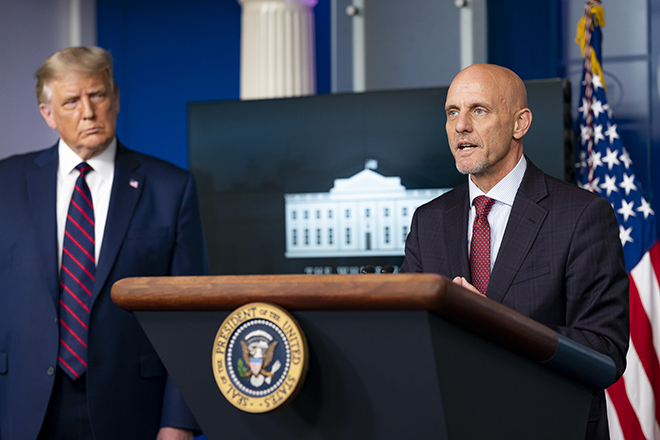
President Donald Trump and U.S. FDA Commissioner Stephen Hahn |
U.S. Food and Drug Administration Commissioner Stephen Hahn stirred more concern within the scientific and public health communities when he said he is willing to grant emergency use to COVID-19 vaccines before late-stage human testing is completed.
Hahn told the Financial Times Aug. 30 that if a biopharmaceutical manufacturer applied for an emergency use authorization, or EUA, before the end of the company's phase 3 trials "we may find that appropriate." However, Hahn also said "we may find that inappropriate."
The FDA commissioner has previously stated an EUA was among the tools regulators could use for a vaccine.
But in the FT interview, Hahn suggested the EUA may be used for certain subgroups of people, though he did not say which populations.
President Donald Trump has made no secret about the fact that he wants the FDA to grant approval by the Nov. 3 U.S. election, stating Aug. 6 that he was "pushing everybody" to get it done.
If Hahn prematurely issues an EUA for COVID-19 vaccines, it would "spectacularly backfire," tweeted Luciana Borio, former acting FDA chief scientist and former director of medical and biodefense preparedness at the White House National Security Council.
The FDA acknowledged in its July 1 guidelines that issuing an EUA for a COVID-19 vaccine before large randomized studies are completed "could reduce the ability to demonstrate effectiveness of the investigational vaccine in a clinical disease endpoint efficacy trial to support licensure." It also said such trials may be needed to investigate the potential for vaccine-associated enhanced respiratory disease — a rare allergic-type inflammation.
"We will not know about safety for many months after full enrollment," tweeted Eric Topol, chair of innovative medicine at Scripps Research. "Some people may have serious untoward reactions."
Topol said it would not be feasible to have sufficient phase 3 data before the Nov. 3 election — agreeing with U.S. National Institutes of Health Director Francis Collins.
Peter Hotez, dean of Baylor University's National School of Tropical Medicine, went further, doubting there would even be data for any subgroups available any time soon.
Virologist Angela Rasmussen, associate research scientist at Columbia University, said she is not outright opposed to the FDA granting an EUA in "such an urgent situation, provided that there is phase 3 safety and efficacy data to support it."
But if a vaccine that is put on the market under an EUA ends up not being safe, "it could harm all the people who take it," Rasmussen tweeted. Even if it is safe but not effective, "it could indirectly harm people by giving them a false sense of security that they are protected," she said.
"Critically, we need the process to be transparent and trustworthy," tweeted Natalie Dean, assistant professor of biostatistics at the University of Florida.
Expert review
While the EUA is an option for COVID-19 vaccines, it is "essential" there is "transparent discussion and thorough review and analysis" of the data by the FDA's panel of independent experts before that fast-track mechanism is used, the Infectious Diseases Society of America and HIV Medicine Association told Hahn in an Aug. 26 letter.
The FDA has scheduled an Oct. 22 meeting of its Vaccines and Related Biological Products Advisory Committee but only to discuss general terms of COVID-19 vaccines and not any companies' specific applications — a decision that alarmed many in the scientific and public health communities.
After much criticism, Hahn said in a late-evening Aug. 28 statement that he was "also prepared to rapidly schedule additional meetings of this committee upon submission of any applications as appropriate," but he did not make any firm commitments to do so. The FDA has repeatedly declined to state if any COVID-19 vaccine-specific advisory panel meetings would be held before an EUA or license is granted.
Planning on EUA for distribution
U.S. Centers for Disease Control and Prevention Director Robert Redfield told reporters Aug. 28 his agency was planning its initial COVID-19 distribution rollout on the "assumption it's an EUA" granted by the FDA.
If it turns out the FDA waits to grant a license, the CDC's distribution plan will be reevaluated, Redfield said.
"There will likely be limited supply of one or more of the COVID-19 vaccines" when any decision comes from the FDA, even though manufacturers have already made millions of doses, the CDC chief said.
The number of infections that must occur in the phase 3 vaccine trials to trigger a decision to look at the data is relatively small — 150 to 175, Redfield noted. Officials emphasized the White House has no insight into the data or access to it at this time, despite Trump's repeated claims of an approval happening soon.
Political pressure
In the Aug. 30 FT report and an interview with Bloomberg later the same day, Hahn insisted that whatever decision the FDA makes would be guided by science and not political pressure from the White House.
However, the White House has controlled recent appointments at the FDA — installing gun-rights advocate Emily Miller as chief spokesperson and Heartland Institute's David Gortler as Hahn's senior adviser. Heartland Institute has been highly critical of the FDA, and Miller has no healthcare experience.
But Miller was removed from her lead communications role at the FDA 11 days into the job as part of an effort to restore the agency's credibility after Hahn stated misleading information when announcing that regulators had granted an EUA for convalescent plasma to treat COVID-19, The New York Times reported Aug. 28.
While her title of assistant commissioner for media affairs was removed from her government webpage, an FDA spokesperson told S&P Global Market Intelligence that Miller "remains an appointee" at the agency.



